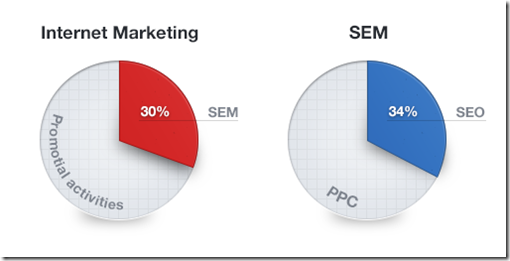SEO compared to the other broadly commented terms related to Internet marketing, is the one that has changed the most over the past few years. Numerous search engine algorithm updates and new features, made the techniques, aiming to build up rankings, outdated, ineffective and even forbidden. Let’s be honest- the methods of SEO yesterday are the songs of history.
Search engines in terms of SEO became a very crowded and competitive space. Earning traffic and scoring higher rankings based on SEO in 2013 is more complex and demanding.
Search Engines and Business Promotion
Every online business is based on traffic. The ultimate goal of Internet marketing is to bring as many people that are or can be interested in your products or services, as possible. The more targeted the traffic is, the higher the chance is that your offer will solve his problem, give the product he’s looking for or generally speaking – satisfy your potential customer’s needs.
Search engines play an essential role in every online marketing strategy. About 30% of overall promotional activities on the Internet focus around search engines. In Search Engine Marketing, we can distinguish two methods of gaining traffic from search engines, PPC or sponsored links campaigns – the paid type and SEO, which is 34% of SEM and focuses on organic traffic.
The reason why search engines are so popular, is that they give entrepreneurs the opportunity to be found by a highly targeted audience, thanks to business-oriented keywords. That makes not only the paid campaigns, but also the content-based ones very effective.
The Old SEO
The old SEO methods focused primarily on developing higher positions in search engine rankings for any particular website. A higher rank equals more targeted traffic from business-relevant keywords. More traffic means more conversions, bigger sales and more revenue.
What differentiated SEO from other traffic gaining methods, is that SEO was mostly a technical process. It focused on on-page and off-page optimization as well as link building.
The rules changed and SEO, which aimed to trick search engines is not about this anymore.
SEO 2013
SEO 2013, from the mostly technical process, became purely a marketing activity and took the shape of a marketing campaign. Saying that technical aspects of SEO are not important, probably would be going too far. The technical aspects are still important, but they should be treated more like a foundation of your efforts. You still have to know how to make proper website optimization, in order to make it more accessible for search engines or content optimization, make it keyword-rich and therefore findable on Google, Bing And other search engines.
In other words, we should leave behind questions like: “How many backlinks do I have?”, “What keywords should I put in the titles and headlines?” and move forward to asking the right questions for the present SEO landscape:
- “What kind of user experience does my site provide to visitors”
- “Does my site provide solutions to their problems”
- “Does my site have remarkable content?”
- “How do I improve my conversion ratio?”
- “How effective is my conversion funnel ?”
- “What content is the most engaging one on my website?”
- “How much traffic do I get from particular keywords?”
- “How do the positions in search engine rankings affect the traffic volume and conversions I get?”
- etc.
SEO Methods old and new
|
OLD SEO |
SEO 2013 |
| Scoring backlinks | Establishing relations |
| Link building – the manual adding of websites to directories and participating in link exchange programs | Link earning – blogging, publishing articles in industry-trusted blogs |
| Optimization for search engines – creating titles and headlines for keywords and adding anchor text | Optimization for users – creating catchy headlines and magnetically engaging content |
| Competing solely in search engines | Competing in industry-related blogs, writing your own blog and social media in terms of content publication |
| Link for link exchange | Offering a link regardless to whether you receive a backlink |
| Standing behind the brand | Personal branding – being the face of the brand |
| Focusing on keywords | Using hashtags |
| Aiming only for more traffic and higher rankings | Aiming for bigger user engagement, brand exposure and thinking about rankings as a reporting metric and a prize for efforts, not an ultimate goal |
| Creating content for clicks and page views | Creating content for user engagement, conversions and revenue |
| Focusing on organic traffic from search engines | Diversifying traffic – Social Media and referral traffic from various websites |
| Pushing content via social media | Communicating with social media around content |
| Getting exposure based on paid media | Getting viral exposure thanks to people |
| Results are generated based on technical methods | Results are achieved by putting time in content creation |
| Analytical and mostly technical knowledge is needed | Analytical and mostly marketing knowledge is necessary |
| Focusing on here and now | Operate in an accordance to strategy |
| Putting attention on numbers | Putting attention on people’s demands |
| Interaction within a communities for backlinks | Participating in a community to share the experience, help people with the problems they encounter |
As you can see, contrary to some people saying that SEO is dead, the fact is that it is very much alive. The difference it that has totally changed, and judging by how the search engines constantly makes tweaks and changes in their algorithms, most likely it will continue to do so.
The New Face Of SEO (infographic)
In addition to the table above, below is a nice infographic put together by FuzzOne Media. One interesting topic mentioned on this infographic is about the “new face” of the SEO team. Sounds more human, don’t you think?
What do you think? Do you see more changes for SEO in the future? What do you think would those be?










Comments are closed.